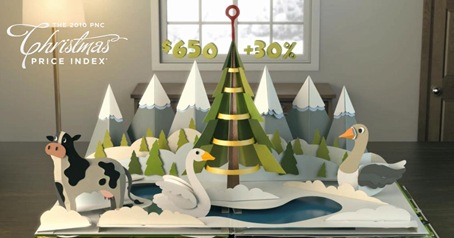« Dagens blogger: jill/txt | Main | Christmas music countdown: Scary Christmas »
December 6, 2010
Christmas music countdown: The Christmas Price Index
This year, your true love will pay a lot more for turtledoves.
2009 gave us an increase in the price of French hens, a decline in the price of a partridge in a pear tree, and a discussion on whether or not ladies dancing would accept a lower wage. I am (obviously?) referring to the 2009 Christmas Price Index.
Today's Christmas countdown music is The 12 Days of Christmas. Each year PNC Wealth Management calculates how much all of the gifts that "my true love gave to me" would cost with today's prices. Then they compare that to the cost of twelve days of Christmas the year before.
This year, well, you can see it for yourself here. After a year of working for a business website, getting economic data presented in pop-up book form is... well... weird. And they present this as though inflation is always a bad thing. Look past all that, or maybe watch the Bloomberg interview instead of the cartoonish website.
The total cost of Christmas is up 9,2% since 2009. This is the largest price increase since 2003, and the second largest since the index began 27 years ago.
The price of gold hit an all-time this year and might reach a new record high about now. That means all those golden rings will cost a true love 30% more than in 2009.
The milkmaids represent the minimum wage, which did not increase this year. However, lords a-leaping and ladies dancing were playing catch-up after 2009, according to the index. The ladies dancing and lords a-leaping have seen a 300% increase in their fees over the past 27 years. Strangely enough, female dancers' wages were up 15% in 2009 and then an additional 15% this year. (Last year Norwegian economist Harald Magnus Andreassen wondered how dancing ladies could possibly be that expensive in the 2009 job market)
Of course the factors in the cost of Christmas are kind of random. Dancers' wages and the cost of birds are probably not the best indicators of how the American economy is doing. Still, since the index started, the price of the goods in the index have decreased relative to the price of services - especially the cost of entertainment. That sounds familiar (and it's been happening in the Norwegian music business too). And this year, the jump in the price of French hens is primarily feed costs, according to PNC's James Dunigan. Which again makes sense.
Posted by Julie at December 6, 2010 10:48 PM
Trackback Pings
TrackBack URL for this entry:
http://www.espen.com/cgi-local/mt/mt-tb.cgi/2652
